Adjourned
Professor Colleen Flaherty Manchester, chair, Senate and Faculty Consultative Committees
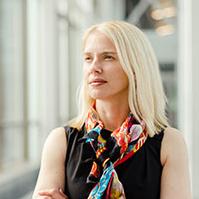
When I reflect on the year, I see many signs that point to renewed strength in shared governance at the University.
First, arguably the most collaborative resolution to date—Workforce Reinvestment: Rebuilding a Better U for Employees—was brought to the University Senate and passed with unanimous support. If you read nothing else in this newsletter, I would encourage you to read the resolution, as it is meant to impact you! The resolution, which was sponsored by the chairs and vice chairs of the consultative committees of the constituent senates (Civil Service, Faculty, P&A, and Student), highlights needed investments that span employee groups as well as those that reflect the groups’ distinct needs. The resolution was informed by multiple years of listening and groundwork laid by consultative committees as well as a whirlwind of committee visits in the spring. While the 17 investment priorities identified in the resolution could have been authored as individual resolutions in one or multiple constituent senates, an intentional decision was made to work collectively, in order to elevate their importance. Delivery of this investment roadmap to the administration was hand-in-hand with the administration looking to shared governance to provide this direction, demonstrating the high functioning of our University’s governance system.
Second, shared governance is reviving or reinventing some prior practices. While senate and committee meetings remain remote, given the greater accessibility this modality provides across the system, we made concerted efforts this year to forge in-person connections. Committee chairs were invited to informal brown bag discussions in order to connect on common priorities; the Faculty Consultative Committee (FCC) returned to its practice of visiting campuses (including a tour of the West Bank Arts Quarter on Twin Cities campus in the fall and a sustainability tour on the Morris campus this spring); and FCC Vice Chair Mark Bee and I joined Donna Spannaus-Martin, faculty legislative liaison, at the Capitol to advocate firsthand for state investment.
Lastly, we are continually striving to improve. Along with the “tiny but mighty” University Senate Office (a phrase coined by Director Erin Heath), committee chairs and many members have been actively considering how to increase our shared governance's impact; enhance constituent engagement through communicating our successes; and construct internal practices to increase effectiveness. Tangible results have stemmed from these efforts: for instance, we’re starting to see an uptick in interest in committee service. We have updated our Constitution, Bylaws, and Rules for the University Senate to reflect current practices and feedback. We have new internal processes aimed at increasing transparency and inclusivity, including a legislative action tracker on the University Senate Governance homepage and in-meeting processes aimed to inform senators of consultation, both recommended and actual.
With the upcoming president transition, including the interim and the upcoming search for a new president, please know that many of your colleagues are actively working to keep shared governance at the University strong. Come join us—apply to serve on a committee, or run for a senate!
In closing, I want to sincerely thank those who have served this year, and emphasize my appreciation for all that University Senate Office staff do to support and facilitate our shared governance system. I also want to specifically highlight the service of Mitch Zamoff, who served as parliamentarian for the University and Faculty Senates for four years. Thank you for your tireless guidance.
Best wishes for the summer term ahead.
The Vickie R. Courtney Award for Outstanding Service to University Senate Governance
The Vickie R. Courtney Award for Outstanding Service to University Senate Governance honors faculty, students, academic professional and administrative staff, and civil service staff systemwide who have made a significant impact on University Senate governance. This year’s recipients are Lynette M. Renner and Adam Sychla.
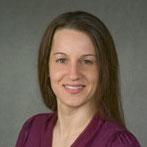
Lynette M. Renner, professor in the School of Social Work, became involved in University Senate governance in 2015, as a member of the Campus Committee on Student Behavior (CCSB), whose members serve on panels tasked with adjudicating alleged violations of the Student Conduct Code. In 2016, Lynette was asked to serve as one of two chairs for the newly formed Student Sexual Misconduct Subcommittee (SSMS). Lynette remained a panel member on CCSB while she undertook this leadership role. Given her research and practice background in interpersonal violence, her focus on procedural justice, and her accumulating experience of serving as a hearing chair, Lynette played a pivotal part in developing and delivering the 8-hour foundation training that was required annually for all SSMS members.
Lynette served as co-chair of SSMS from 2016-2020 when the subcommittee was disbanded due to changes in federal Title IX regulations. She also served simultaneously as chair of CCSB from 2018-2022. Although she reached her six-year term limit on CCSB in 2021, she agreed to serve as chair for an unusual seventh year when there was difficulty in finding someone to fulfill this role. When consecutive term limits required Lynette to rotate off of CCSB, she joined another adjudicative body, the Senate Judicial Committee (SJC). This committee hears faculty complaints of alleged violation of the tenure code and, like CCSB and SSMS, requires the utmost impartiality and discretion. She was also elected to the Faculty and University Senates in 2022. We thank Lynette for her continued dedication to University Senate governance!

Adam Sychla is a 5th year PhD candidate in the Biochemistry, Molecular Biology and Biophysics Graduate Program. Adam has been representing the College of Biological Sciences since 2019, first as a senator for three years, and now as Student Senate vice chair. He also served as a student representative on the Student Sexual Misconduct Subcommittee from 2019-2020.
In his capacity as Student Senate vice chair, Adam is a member not only of the Student and University Senates and the Student Senate Consultative Committee (SSCC), but also the Senate Consultative Committee and the Student Senate Nominating Subcommittee. As part of the SSCC leadership team, he also attends meetings of leaders of the four consultative committees (Faculty, Student, P&A, and Civil Service). At these numerous meetings, Adam poses thoughtful questions and fosters engagement of members in creative and productive discussions that move towards action. In addition, as one of the longest serving student senators, Adam has authored three resolutions and pushed various projects to completion. He is known for encouraging fellow students to accept and seek service and leadership roles within University Senate governance, as well as modeling exemplary senate and committee service to new members. His nominators describe him as collaborative, supportive, compassionate, and kind. University Senate governance and the University of Minnesota are better because of his dedication.
The Big Issues
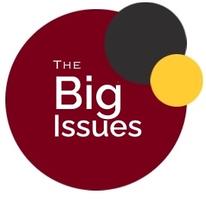
The work of the University and Faculty Senates is accomplished primarily through their standing committees and subcommittees. Faculty, academic professional and administrative staff, civil service staff, students, and administrators have designated positions on most committees.
Workforce Reinvestment: Rebuilding a Better U for Employees
After more than a year of gathering feedback from faculty, staff, and student constituents, and with the support of President Joan Gabel and other administrators, the chair and vice chair of the Senate and Faculty Consultative Committees (SCC and FCC) drafted a comprehensive resolution titled Workforce Reinvestment: Rebuilding a Better U for Employees. This legislative action requests new resources from the administration to achieve four primary goals for the University workforce: (1) provide livable, equitable, and competitive pay; (2) recruit, reward, and retain people; (3) establish clear pathways for professional development and career advancement; and (4) foster a culture that promotes manageable workloads. The leadership of all four constituent senates co-sponsored the resolution, and joined the authors in consulting with nine University and Faculty Senate committees and other interested parties to develop final language that was inclusive of the full communities’ concerns. The resolution was discussed and unanimously supported by the University Senate at its April meeting. The authors will continue to engage with the administration to advance this work.
Substance Misuse Recovery Resolution
This year, the Disabilities Issues Committee has been working on a resolution on building a community for students in recovery from substance misuse. The resolution advocates for a full-time coordinator to oversee recovery services on the Twin Cities campus and serve as a resource for system campuses. This position would support and supplement the current Recovery on Campus (ROC) program, which is student run. Professors David Johnson, committee chair; Jennifer McComas, incoming chair; and Gayle Golden, committee member, consulted with a number of officials from Boynton Health, the Office of Student Affairs, and the Office for Equity and Diversity, as well as the student coordinators of the ROC program. Initial consultations took place with the Equity, Access, and Diversity Committee; the Social Concerns Committee; and the Student Senate Consultative Committee. The Social Concerns Committee endorsed the resolution, and further consultation with other committees, as well as with system campus substance use and recovery professionals, will take place in the coming months. The committee hopes to bring the resolution to the University Senate for approval in the fall.
Input on Interim President Position
Following President Gabel’s recent resignation announcement, the chair of the Board of Regents (BOR) notified the University community that plans would be made to appoint an interim president, followed by a search and selection process to hire the next University president. Governance leadership learned that there is no current policy or existing practice in place directing the BOR on how to appoint an interim president, and Board leadership encouraged input from shared governance. In response, Senate Consultative Committee (SCC) leadership worked quickly to gather input from all four constituencies about the desired process for selecting an interim president, and the leadership qualities that shared governance considers especially important for this position. This input was included in a letter to members of the BOR, signed by members of the SCC, and distributed to the Board in advance of their discussions and votes on next steps for the interim appointment. The Regents expressed gratitude for this feedback and assured governance leadership that the information provided in the letter informed their discussions.
A View from the Inside: The Making of a New University Holiday
Amber Bathke, senior senate associate, University Senate Office
Missy Juliette, senate associate, University Senate Office

In a few weeks, the University will close to observe Juneteenth as an official University holiday for the first time. Members of shared governance are eager to acknowledge this important day through official University closure, an honor that befits the significance of the holiday. Indeed, people have been awaiting this observance: As the Minnesota Daily pointed out in its coverage of the announcement, President Joe Biden signed legislation declaring Juneteenth a federal holiday into law nearly two years ago. The Daily stated that “it often takes about two years to add a new holiday,” but did not go into why, leaving many people wondering what that meant and why it takes so long.
The reasons behind the lengthy process are likely more positive than many people assume: it took so long, in part, because of the extensive consultation that goes into changes to the calendar. While observing Juneteenth was by no means controversial, a number of steps are built into the calendaring process to ensure alignment with University policy, federal law, and community values. A number of governance committees are involved, as are several other constituencies. In addition, because the academic calendar is the purview of the faculty, while the Office of Human Resources (OHR) manages University holidays, adding a paid holiday involves two separate processes that each contain several steps.
Academic Calendar
First, since the Juneteenth observance falls on a class day during the summer session, the academic calendar needed to be adjusted. When the federal holiday was announced in 2021, it was too late to change the academic calendar, as classes had already been scheduled. University policy, accreditation requirements, and financial aid regulations require a certain number of days of instruction—adding a non-instructional day at the last minute (in University terms!) was just not feasible. Conversations began, however, around designating it as a non-instructional day for 2022, while parallel conversations about making Juneteenth a paid holiday for faculty and staff took place on the human resources side. The Academic Calendars Task Force was charged in fall 2021, with making Juneteenth a non-instructional day first on its to-do list.
In fall 2021, the task force brought a recommendation to make Juneteenth a non-instructional day to the Senate Committee on Educational Policy (SCEP), which under University policy must approve the academic calendar. SCEP approved the proposal, forwarding it to the Faculty Consultative Committee and the Faculty Senate for final approval. A special meeting of the Faculty Senate was held on January 20, 2022, and senators approved this proposal.
Paid Holiday
Second, fixed University holidays are set by OHR, with each campus determining their own floating holidays. Under the Civil Service Employment Rules, the Civil Service Consultative Committee (CSCC) recommends the placement of floating holidays for the Twin Cities and Rochester campuses to the Office of the President. In January 2022, OHR proposed to re-assign one floating holiday for the Twin Cities and Rochester campuses in 2023 and 2024 to Juneteenth. Additionally, the proposal from OHR requested that the Civil Service Employment Rules be amended to anchor one of the four annual floating holidays to Juneteenth permanently, making it a University-wide holiday.
The CSCC discussed this proposal at their January 2022 meeting. While members were supportive of recognizing Juneteenth as a University holiday, the committee unanimously agreed that it should be added as an additional holiday, rather than re-assigned from the list of published floating holidays. Members expressed disappointment in a proposal requesting that employees relinquish this floating holiday, noting that it was counter to a systemwide message sent on June 18, 2021, from OHR, which seemed to imply that the University would add an additional holiday to the University holiday calendar to commemorate Juneteenth.
On January 21, 2022, the CSCC sent a letter to President Joan Gabel and Vice President Ken Horstman, OHR, advocating for Juneteenth to be added as an additional holiday so employees could observe this important occasion. The CSCC received a response from President Gabel in August 2022 stating that adding Juneteenth as a floating holiday aligned with MPact 2025, and that Vice President Horstman would reach out to civil service leadership to begin the process of revising the Civil Service Employment Rules. The Civil Service Employment Rules Subcommittee worked with OHR to draft language to designate Juneteenth as a permanent University holiday, and held two public hearings as required under the Rules. After the amendments to the Civil Service Employment Rules were approved by the Civil Service Senate, the Board of Regents voted to approve adding Juneteenth to the University holiday calendar at their March 2023 meeting. The holiday was announced on March 13, 2023.
While it may have taken awhile, shared governance members were pleased to be involved in this important initiative—and we all have the CSCC to thank for an additional paid holiday and the opportunity to observe Juneteenth with the gravitas it deserves.
University Senate Governance Working For U
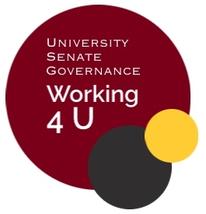
Each senate has an executive—or "consultative"—committee. Members of the consultative committees are elected to represent the respective bodies.
Senate Consultative Committee (SCC)
The Senate Consultative Committee (SCC) spent the spring semester receiving updates on a number of strategic administrative initiatives. In April, the committee visited with Senior Vice President for Finance and Operations Myron Frans and Vice President for Clinical Affairs and Dean of the Medical School Jakub Tolar to learn about the current legislative funding request to acquire and operate the University Medical Center East and West Bank, the Masonic Children’s Hospital, and the Clinics and Surgery Center. Committee members also met with Laura Fiero, employee wellbeing consultant, and other staff in the Office of Human Resources (OHR), to continue discussions about the effectiveness of the University's Employee Wellbeing Program. In response, in part, to concerns raised by the committee in the fall related to the impact of the wellbeing program on employees, OHR is working with the Office of Measurement Services to conduct a broad survey in the University community to ensure the program is providing on-going value to employees.
The committee also reviewed and approved proposed changes to the University Senate Constitution, Bylaws, and Rules, which were approved by the University Senate this spring. In addition, the SCC consulted heavily on the Workforce Reinvestment: Rebuilding a Better U for Employees resolution, authored by the SCC chair and vice chair, and passed by the University Senate. In response to President Gabel’s departure announcement, the committee wrote a letter to members of the Board of Regents to provide input on the process and priorities for selecting an interim president. Finally, the committee sent a request to the Campus Safety Committee to examine current practices around racial descriptions in SAFE-U notifications.
Faculty Consultative Committee (FCC)
The Faculty Consultative Committee (FCC) had a number of unique engagement opportunities this semester. Early in the semester, committee members met with members of the Board of Regents (BOR) to discuss the need for new long-term investments in faculty and staff. Committee leadership also brought this message to the state legislature by creating and distributing a handout to state lawmakers at a meeting of the Senate Higher Education Committee at the Capitol. In April, members took a day trip to the Morris campus to meet with Morris faculty and learn about the campus’s history as a Native American boarding school, as well as its award-winning sustainability efforts. The committee also consulted on a number of important initiatives, including the draft Indigenous Research Guidelines, the Core Curriculum 2025 proposal, the Women’s Faculty Cabinet Gender Equity Report Card, and the proposed dissolution of the COVID-19 vaccine mandate for University employees and students.
Student Senate Consultative Committee (SSCC)
The Student Senate Consultative Committee (SSCC) and members of the Student Senate addressed a variety of issues this semester and worked on multiple resolutions. Jacob Richter, a student senator from the College of Liberal Arts (CLA), spearheaded efforts to address student concerns about receiving feedback on assignments in a timely manner, in order to better monitor their progress in their courses. Students also tackled issues around access to health insurance benefits for specific students: led by Bob Libal, School of Public Health, and Jovany Betancourt, Medical School, their resolution asked the University to remedy a technicality that rendered full-time students in the School of Public Health ineligible for student health benefits. Additionally, representatives from the Duluth campus, led by SSCC member Michael Waldorf, advocated for adequate legislative funding, especially the University’s request for additional scholarships for students at system campuses, in an effort meant to address the recent trend of declining enrollment at these campuses.
Additionally, the SSCC and Student Senate consulted with a number of administrators regarding emerging issues across the system. Such consultation included discussions with Myron Frans, senior vice president for finance and operations; and Jakub Tolar, vice president for clinical affairs and dean of the Medical School, regarding the potential merger of the Fairview and Sanford Health systems and its impact on the University. Students were vocal in their concerns for what the merger would mean for the future of academic medicine at the University, and the ability of the University to continue to be a leader in providing industry-leading care for the state. The SSCC further advised administrators regarding the potential sunsetting of COVID-19 vaccination policies. While students recognized that the world is in an endemic phase of the global health crisis, they emphasized that the University should still take proactive measures to make sure its student body is protected, including continued public health messaging. Finally, students held discussions with the Twin Cities Student Unions and Activities in order to get a better sense of how student engagement trends have changed since the pandemic. Throughout the academic year, SSCC chair Pavan Guttipatti has highlighted the importance of student engagement and ensuring that students have ample opportunities to make their voices heard.
Civil Service Consultative Committee (CSCC)
The Civil Service Consultative Committee (CSCC) started the spring semester with a visit from Regent Mary A. Davenport in February. During her visit, Regent Davenport discussed her perspectives on challenges facing the University, such as financial uncertainty and declines in enrollment. Committee members also expressed concerns about salary compression and the University’s lack of a human capital strategy. Regent Davenport underscored the critical and impactful work of shared governance.
Over the past year, the Civil Service Employment Rules Subcommittee worked behind the scenes to amend the Civil Service Employment Rules to reflect the addition of Juneteenth as a paid University holiday, as well as clarifying language about the application of probationary periods and holiday observances for those who work weekends. In February 2023, two public hearings were held for all civil service employees to provide feedback. The Civil Service Senate and CSCC approved the amendments, and the Board of Regents approved them at its meeting on March 10, 2023.
The CSCC continues to advocate for a human capital strategy and attention to the issue of salary compression. Civil service senators and CSCC members provided feedback on the Workforce Reinvestment: Rebuilding a Better U for Employees resolution. Next year, the committee will revisit the discussion of ways to create equity surrounding staff representation in the Senate Consultative Committee.
P&A Consultative Committee (PACC)
In a busy and dynamic spring semester, the P&A Consultative Committee (PACC) continued its work of representing and advocating for the 7,000+ P&A employees at the University of Minnesota. PACC members responded to constituent concerns and interests by engaging with administrative leaders and colleagues from the Civil Service, Faculty, and Student Consultative Committees. Collaborative projects included co-authoring the Workforce Reinvestment: Rebuilding a Better U for Employees resolution; providing a summary report of identified barriers for P&A employees accessing the Regents Scholarship—the culmination of more than two years of work by P&A Senate members engaging with their constituents; and working directly with members of the Board of Regents (BOR) to advocate for increased opportunities for public engagement as well as engagement with University Senate governance leaders.
Within the smaller sphere of the P&A Senate, PACC initiated a new “Campus 101” portion of P&A Senate meetings, providing senate representatives from each campus and University of Minnesota Extension opportunities to showcase their communities’ unique contributions, perspectives, and concerns. The initiative has been well received, and P&A Senate members have learned some amazing things—did you know University of Minnesota Extension programs serve over one million Minnesotans annually?
University/Faculty Senate Recaps
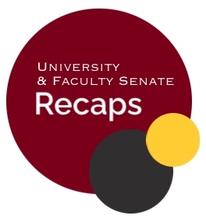
February 23, 2023
At the University Senate meeting on February 23, senators approved changes to the University Senate’s governing documents that were proposed as the result of a multi-year comprehensive review project. At the Faculty Senate meeting, members heard about and endorsed recommendations of the Task Force on Faculty Behavior in Graduate Education, led by Professor Phil Buhlmann. They also received an update from Professor Jennifer Goodnough on a parallel Task Force on Faculty Misconduct.
March 30, 2023
At the University Senate on March 30, Professor Colleen Flaherty Manchester, chair of the Senate and Faculty Consultative Committees, presented a resolution, Workforce Reinvestment: Rebuilding a Better U for Employees, for discussion. Senators were enthusiastic about the content. At the Faculty Senate, Flaherty Manchester presented proposed amendments to the Faculty Senate Rules, to be voted on in April.
April 27, 2023
Several long-term initiatives came to fruition at the April University and Faculty Senate meetings. University Senate members approved the resolution on Workforce Reinvestment: Rebuilding a Better U for Employees. Faculty senators approved the slate of Twin Cities candidates for the Faculty Consultative Committee; amendments to the Faculty Senate Rules; and a new educational policy on Retroactive Withdrawal and Academic Restoration.
A Message from the Director
Erin Heath, director, University Senate Office
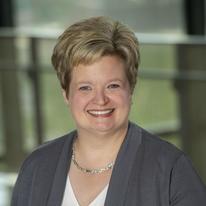
As of now, it looks like spring may finally stick around! I don’t know about you, but it has been difficult for me to believe we are at the end of another academic year when, until very recently, the weather more closely resembled early March.
University Senate governance, as you can see from the articles above, has continued to engage actively on a number of issues. To see what else governance has been up to, please check out the legislative action tracker on our homepage. This tracker, new to this academic year, was created by the University Senate Office staff to publicly document the work and priorities of our five senates and 27 senate and consultative committees systemwide.
There have been other firsts within University Senate governance this year. The Term Faculty and Academic Professionals Subcommittee (TFAPS), for instance, was created to address matters related to term faculty and academic professionals, including the review of and advocacy for policies, practices, and procedures pertaining to this employee group. In addition, the Faculty Advisory Committee on the Health Sciences (FACHS) completed its first full year of work as a senate committee repurposed to address issues specific to health sciences faculty. With the proposed merger of Sanford Health and Fairview announced earlier this year, FACHS members were uniquely positioned to serve as a resource for leadership on this, as well as other issues and challenges specific to the health sciences, which also impact our greater community. These are just a couple of examples of the continued responsiveness of shared governance to evolving needs within the University.
As the academic year comes to a close, I wish to thank all the senate and committee chairs and members who have contributed their time, energy, and commitment to the University community. Looking ahead, the recent appointments of four regents to six-year terms and our interim president, as well as the subsequent search for a permanent president afford many impactful opportunities for those who value the University community and seek to make a positive impact on our future direction. I invite those of you who may be interested in being a part of University Senate governance in this transformational time to learn more about our varied committees and senates, connect with your senator, or reach out to the University Senate Office to learn more about how you can be involved, be heard, and make a difference!
With warmest wishes for a safe, happy, and seasonable summer!